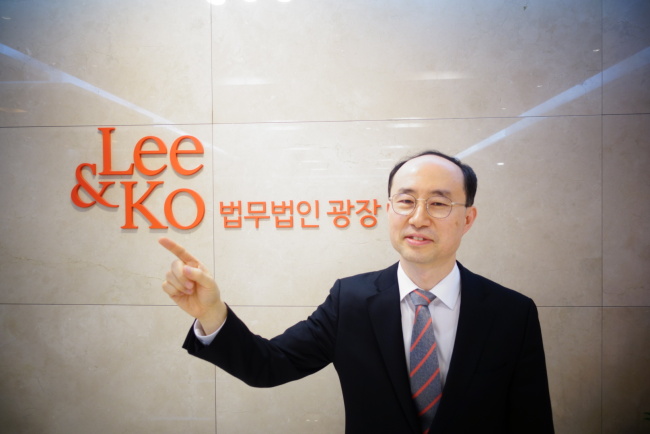Trademark rights, which determine whether a name, sign, or expression may be commercially monopolized by a specific business entity, are often a subjective notion that constantly interacts with the changing society, according to an intellectual property litigation expert.
“One of the most distinctive characteristics of trademarks is that they are strongly influenced by consumer sentiment at a given time,” Kim Un-ho, partner in the IP Practice Group at law firm Lee & Ko, told The Korea Herald in an interview.
Prior to joining South Korea’s second-largest law firm in 2009, the senior lawyer worked in the IP division of the Seoul High Court and the Supreme Court. He had also served as lecturer on IP damages and litigations at the Judicial Research and Training Institute.
 |
Kim Un-ho, partner in the IP Practice Group at law firm Lee & Ko. (Bae Hyun-jung/The Korea Herald) |
Addressing trademark rights and other IP-related matters, Kim referred to a winning trademark nullity litigation, in which Lee & Ko represented a local restaurant franchise that uses a North Korean city name as its brand.
The Supreme Court in February ruled in favor of plaintiff Sariwon Bulgogi, saying that the name of the city -- located in North Korea’s North Hwanghae Province -- is a distinguished geographical site and therefore may not be monopolized by a specific enterprise.
The restaurant was given notice in 2015 that it should discontinue the use of its brand name, based on a claim by Sariwon, another franchise specializing in naengmyeon and bulgogi headquartered in Daejeon.
The latter, which had been operating since 1951, registered the name Sariwon as its trademark in 1996, four years after the other restaurant kicked off business in Seoul.
“Sariwon has been one of the representative cities of the North Korean region since the Joseon era and qualifies as a distinguished geographical name,” the Supreme Court said in its latest ruling, reversing two previous rulings by the patent court.
The top court also dismissed a public survey submitted by defendant Sariwon, saying that the validity of a trademark should reflect the public sentiment at the time of registration.
“The survey (which showed that a majority of consumers perceive Sariwon as a Korean food franchise name) cannot be seen as properly reflecting the public’s perception as it was conducted 20 years after the trademark registration.”
Due to such variability, trademark issues often create disparities among experts, sometimes between the patent court and the common court, according to the former judge.
“Unlike patents, which are defined strictly on technical criteria, trademarks largely reflect a society’s thoughts and perceptions and thus respond to chronological changes,” he said.
“Even the latest Sariwon case may lead to a different legal conclusion in the future, should the two Koreas be reunified in which case the (South Korean) public will have direct access to (the city of) Sariwon.”
Another major challenge for South Korean trademark right holders is the rampant trademark copycat practices in the Chinese market, Kim added.
“Despite being the No. 1 exporter to China, South Korea remains seventh in terms of trademark applications there, giving room for local brokers to cut in,” he said.
An example is Sulansoo, a widely circulated imitation brand of Sulwhasoo, a top-selling herbal cosmetics brand affiliated with Korean conglomerate Amorepacific.
“Korean companies often have a hard time claiming their brand in China, as the Chinese law does not offer protection for foreign trademarks that are unregistered under the local system,” Kim explained.
Rising as one of the world’s top patent and trademark applicants over recent years, China has been gesturing at expanding its range of IP protection, but still the best and only defense for foreign businesses is to pre-emptively register trademarks, the expert said.
“One may never exaggerate the importance of pre-emptive measures when it comes to IP rights, especially as the key agenda is expanding from trademarks to patents and to trade secrets nowadays,” Kim said.
Lee & Ko represented the nation’s top steelmaker Posco in reaching a settlement in 2015 over a 1.4 trillion won ($1.3 billion) trade secret litigation filed by Japan’s Nippon Steel.
“Patent suits in the cutting-edge information technology or pharmaceutical fields often involve massive sums which may turn a whole industry upside down,” said Kim, who led the given litigation.
“After decades of witnessing the growing importance of IP in the business world, companies now understand that anticipative moves and sufficient investment in IP rights may be crucial for the sake of survival.”
By Bae Hyun-jung (
tellme@heraldcorp.com)
The Korea Herald is publishing a series of interviews on experts in the intellectual property sector. This is the eighth installment. -- Ed.







![[Today’s K-pop] Blackpink’s Jennie, Lisa invited to Coachella as solo acts](http://res.heraldm.com/phpwas/restmb_idxmake.php?idx=644&simg=/content/image/2024/11/21/20241121050099_0.jpg)
